Nothing stirs within the thatched houses that occasionally crack the forested monotony along the upper Pomeroon River. Even the cries of the few birds who brave the humidity of the afternoon seem wilted.
“Sometimes people say we are behind God back,” says a teacher at the Ulele Primary School. In the verdant, hilly community, where the dark, still waters of the Pomeroon River reflect the green trees and blue sky, it might have been a place where a deity could rest after travelling under an uncommonly hot afternoon sun in intense humidity that promised rain.
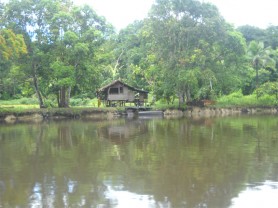
Karawab: Small thatched roof houses blend into the thick forest along the Pomeroon River – the ‘highway’ of the area. To get to Kawarab, you use a boat or… a boat. About forty miles away from Charity – the main town in the Pomeroon – Karawab, an Amerindian community was formally recognized in 1970, said David Campbelle, a radio operator and longstanding resident. But years before then the land attracted people including Campbelle, who married a local lady, Sylvia, in 1966.
The population numbers a few hundred – 600 persons between Karawab and the nearby village of St Monica, estimates one teacher – but most seem hidden within the forests of Karawab. Few boats go there regularly, and it is expensive, the teachers at the Ulele Primary School say, chatting with this newspaper as the school day wound down and children were preparing to skip down red paths and paddle canoes bigger than themselves.
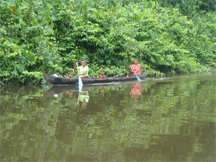
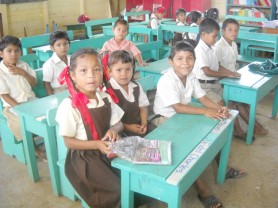
The Ulele Primary School, a small building with rotting walls, was established in 1981. With over 200 students enrolled, it is overcrowded and now the community centre houses the students who attend the secondary annexe. The authorities are supposed to be “patching” the old building. “We really in need of a new school now,” one teacher exclaims. But they are excited about a new sanitary block being built and the promise of a solar panel for the school. There is no electricity in the community though some residents have purchased solar panels and generators.
The school is understaffed. On average, about ten students graduate every year with the intake being about 25 to 30 students, “the reproduction rate is very high…” Most of the teachers are from outside the community and they highlighted that there were few options in the village for youths. The older residents farm, but most of the youths now head
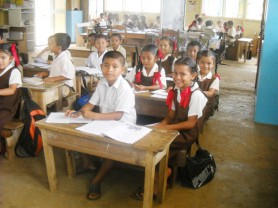
out of the village, mostly to the mines.
The health worker headed out too earlier this year for a two-year training programme, but a midwife visits on Fridays. However, the residents say that there should be a health worker based there.
While the quiet life of the village might be attractive to many with hectic lives, for some residents, it is “boring.” They want to know “what the world doing.”
With only a radio set for communication with the wider world, the teachers say crucial information such as a workshop they need to attend, most times gets to them after the activity has been completed. A resident has found an ingenious way to reach out. On the highest hill in the community, a pole with a wire attached points skywards. Villagers connect this to a cellular phone and presto, telephone calls! And only a hike away! But residents say they want a better communication system.
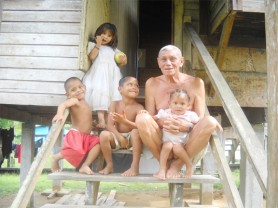
Otherwise a little news comes via one newspaper purchased by a villager. “When he finish reading it, if you want it, he sell it to you,” Campbelle, 74, related.
Engaged in farming ground provisions, pineapple and other crops, the extra that the villagers have are usually sold within the community or sometimes taken to Charity. Campbelle recalled that some time back a government official came to visit to find out what they were growing. Residents
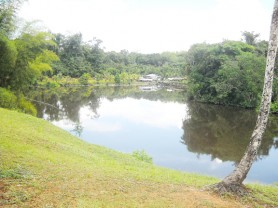
complained about acoushi ants affecting their crops and the official promised that he would try to see whether he could get some bait for them, but up to now they have seen nothing, Campbelle said, adding, “We nah get no market for our produce and sometimes we buy from each other.”
The older residents farm, the younger generation goes to seek their fortune in the mines. The community is changing.
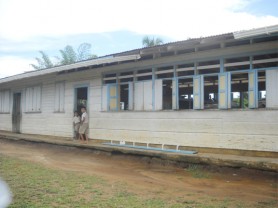
On the crest of a hill lies a tomb, painted green. Karawab was formally established with the help of parliamentarian, Joseph Caldeira. The graves of his wife and children lie nearby. Although they never lived in the village, it was chosen as their final resting place because of Caldeira’s efforts on behalf of the village. Campbelle recalled that as more and more people moved to the area in the 1960s, they told Caldeira that they needed a school. It was built by self-help and the village grew and was then formally recognised
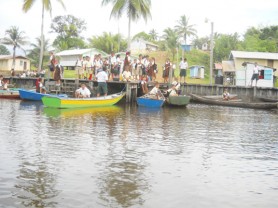
by the Forbes Burnham administration.
Asked what was special about the community and people smiled: “The people”; “Our culture… we are unique.”
“We live a friendly life,” Campbelle said. “We live a happy life between each other. We live nice here. We love our neighbours.”
In days gone by, with alcohol becoming more easily available, the village slid down an immoral
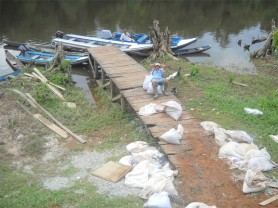
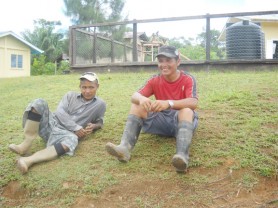
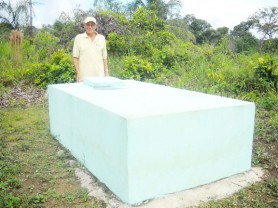
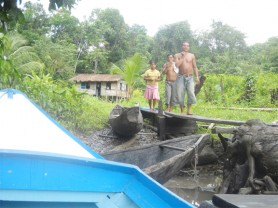
path with fights and similar activities becoming common, Campbelle recalled. “We built churches,” he said. “People came to God.” Now, there are several Christian denominations and residents agree that it is peaceful.
But as twilight approaches, in the deepening shadows lights twinkle on in one house and then another, and music rises to drown out the cries of the night birds of Karawab. “Sometimes people say we are behind God back.”





